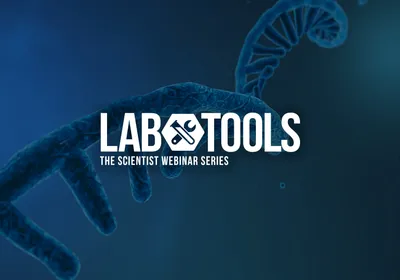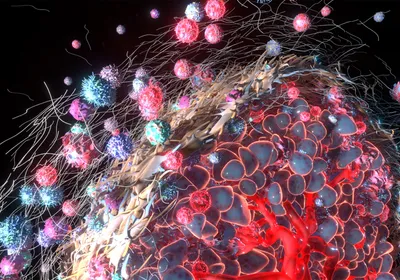 An artist’s imagining of retro Formula 1 racecars as banded chromosomes to highlight the Cancer Genome Atlas Research Network’s effort to identify molecular drivers of cancerMARK JARMANWhile researchers have known for years that cancer runs in families, the hundred or so genes that have been predicted to affect cancer development don’t account for how widespread heritable cancers are. A study published today (April 5) in Cell finds more than 850 rare genetic changes that are inherited and found in every cell in the patient’s body—germline variants—that can contribute to cancer’s progression and are common across multiple cancer types. The findings help explain some of cancer’s heritability and suggest that sequencing healthy tissue alongside tumor tissue is important for optimizing treatments.
An artist’s imagining of retro Formula 1 racecars as banded chromosomes to highlight the Cancer Genome Atlas Research Network’s effort to identify molecular drivers of cancerMARK JARMANWhile researchers have known for years that cancer runs in families, the hundred or so genes that have been predicted to affect cancer development don’t account for how widespread heritable cancers are. A study published today (April 5) in Cell finds more than 850 rare genetic changes that are inherited and found in every cell in the patient’s body—germline variants—that can contribute to cancer’s progression and are common across multiple cancer types. The findings help explain some of cancer’s heritability and suggest that sequencing healthy tissue alongside tumor tissue is important for optimizing treatments.
“This paper is just an eye-opener,” says Hendrik-Tobias Arkenau, an oncologist, researcher, and medical director of the Sarah Cannon Research Institute in the U.K. who was not involved in the work. “It confirms what we see on a day-to-day basis: that there’s a large number of patients who have genetic alterations [that] need to be appropriately managed,” he adds.
The pathogenic germline variants are highly expressed in the tumor, which suggests that they are under selection and the tumor cells need them to keep the cancer progression going.
Li Ding, a cancer geneticist at Washington University in St. Louis, and colleagues analyzed data from the Cancer Genome Atlas (TCGA), which includes the genomes of normal tissue and tumors from more than 10,000 adults with 33 ...























